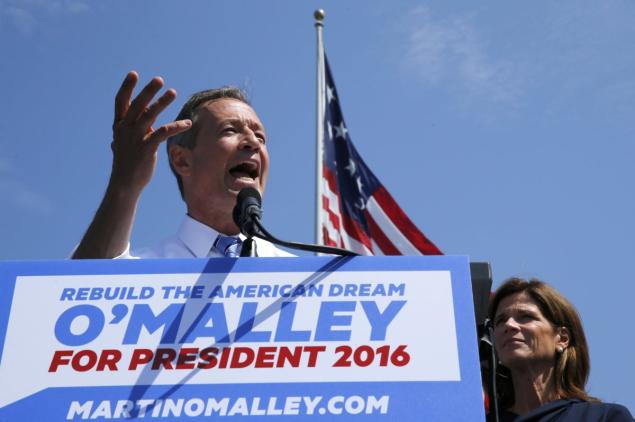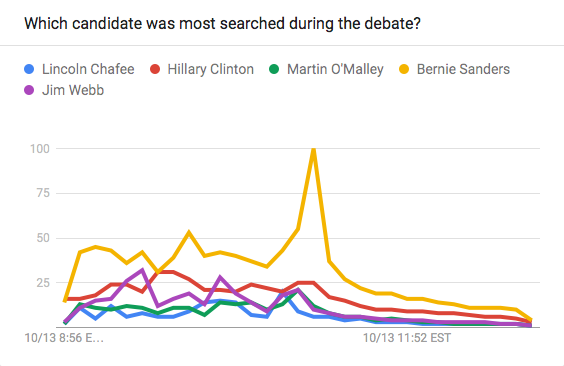No Dirty Tricks
My son made me watch the Democratic debate this week (a first!) and I’m glad I did. What a contrast to the Republican debate!
I love to read the reviews of debates like this and, more than any other time, I was shocked at how the media interpreted the result compared to my understanding.
My analysis first and then I’ll do a round-up of what the pundits are saying.
I don’t think debates like this are a zero-sum game, especially at this stage in the race. Each participant has different goals and it’s possible for more than one candidate to achieve their objectives. For example,
Hillary Clinton is the front-runner by an overwhelming margin. She is unpopular within her own party and there’s a sense that she is the inevitable candidate because she is the inevitable candidate. She needed to do well enough to assure her supporters that she really is the candidate that she thinks she is; well enough to convince Biden that he would be wasting his time to join the race; and to show just enough charm and deference to Democrats further to her left that she is not a complete robot and/or tool of the plutocracy. Hillary achieved her goals.
Bernie Sanders needed to excite his supporters and to demonstrate that he is not the crazy socialist that everyone says he is. He also needed to make a good introduction to the people who are seeing him for the first time. I’m sure he knows as well as anyone that he is a long-shot but if he can move the Overton Window to the left, he is a winner. Bernie achieved his goals.
Martin O’Malley probably doesn’t expect to become president either but he didn’t disgrace himself. I doubt that he moved the needle on his campaign to be president but he probably made it a little bit more likely that he’ll get a post in the next Clinton administration. He’s probably content with that.
Lincoln Chafee and Jim Webb should just stay home for the next debate. They lost.
The day after the debate, the mainstream pundits proclaimed with one voice that Hillary was the overwhelming winner and that the other candidates were a disgrace.
Hillary Clinton won. She won because she’s a strong debater. She won because Bernie Sanders is not. She won because the first Democratic presidential debate focused on liberal policies — and not her email scandal or character.” — Ron Fournier, The National Journal
“Hillary Clinton won because all of her opponents are terrible.” — Ryan Lizza, The New Yorker
Clinton demonstrated that she was, by far, the best presidential candidate onstage. Indeed, she may have been the only person onstage actually running for president. […snip…] But none of them waged the kind of frontal assault that would be required to dislodge a front-runner who commands Clinton’s breadth of institutional support. — Jonathan Chait, New York Magazine
The commentators on the right actually thought that the whole debate was a setup, staged to make Hillary look presidential.
The most irritating criticism though came from those voices of the center-right who have been telling us for years that there’s no virtue left in politics and that everyone just wants to get in a cheap shot or score points with sound-bites. When—finally!—there’s a debate where politicians talk about the issues, they’re all aghast at the lack of character assassination.
Here’s David Brooks on the Newshour.
…the one advantage the Republicans have is they actually, a bunch of them want to be president. On the Democratic side, only one person wants to be president. That’s Hillary Clinton.
and
But the other factor is, the Republicans are actually arguing and fighting with each other. And what I saw up there was Hillary Clinton performing extremely well, and four other guys lying down and let her, letting her have the nomination. It’s like Bernie Sanders held up the white flag of surrender when he refused to really go after her on the character and moral issue, which is his only way in. — David Brooks, The Newshour
Really, David? The only way for Bernie Sanders, a democratic socialist, to distinguish himself from the centrist front-runner is on moral issues?
Ross Douthat was even more nakedly critical of Bernie’s hesitance to get down and dirty.
by declining to attack Clinton on the issues where she’s actually most vulnerable — issues that have driven down her numbers with swing voters these last few months, issues that make her a weaker-than-expected general-election bet — Sanders is preserving his present popularity at the expense of any possibility of actually knocking off the frontrunner, actually beating her at the polls.—Ross Douthat, NY Times
Does it not occur to them that Bernie has no interest in winning a dirty tricks campaign? Even if he doesn’t win, he can shift the debate more significantly by staying true to his principles.
Rare among the pundits, Michelle Goldberg saw this.
His statement made him look like a mensch and a man of principle, ensuring that the debate remained a surprisingly substantive exchange on the issues he cares about most, rather a GOP-style pro-wrestling match. He actually seemed less interested in taking down the front-runner than in elevating his own ideas. That’s hugely rare in a politician. Clinton supporters who want a more progressive America have reason to be grateful for her strongest challenger. — Michelle Goldberg, Slate
AlterNet points out how much Bernie’s performance did for him in the polls.
Bernie Won All the Focus Groups & Online Polls, So Why Is the Media Saying Hillary Won the Debate? Bernie Sanders by all objective measures “won” the debate. Hands down. I don’t say this as a personal analysis of the debate; the very idea of “winning” a debate is silly to me. I say this because based on the only relatively objective metric we have, online polls and focus groups, he did win. And it’s not even close. —Adam Johnson, AlterNet
Bernie did pretty well in GooglePoints too.
In the end though, I have to agree with Matt Yglesias.
Clinton, in short, isn’t a flawless candidate, nor did she deliver a flawless debate performance. But she doesn’t need to be flawless to win — she just needs to be better than the opposition. And against a relatively weak field, she dominated. — Matt Yglesias, Vox







